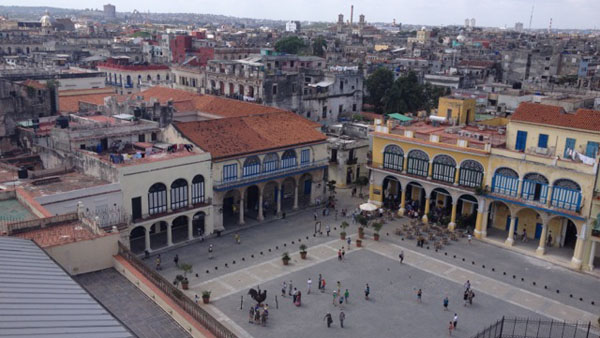The noise of an engine of a vintage Chevy sounds like popcorn popping uncontrollably in a kettle. Marc Anthony’s “Vivir Mi Vida” blasts from scratchy speakers inside many homes. Vivacious boys sword-fight with sticks, wearing nothing but their Spider-Man underwear. Walking down the streets of Havana, Cuba, these signs of life can be seen and heard.
Sometimes, I wonder if I am in the same place some Americans told me about when I first said I was studying abroad in Cuba. It seemed like everyone had a remark to make about Cuba. “Poor,” “isolated” and “dangerous” were among the many words used to describe this island. The assumptive tales they told of Cubans were equally disturbing: “Some Cubans won’t like you because you are American,” “Cubans are very aggressive” or my favorite, “Don’t talk about politics, or you’ll get thrown into a Cuban jail.” These comments were astounding. How is it that Americans still have so much to say about an island they know so little about?
Cuba is not a closed-off, crumbling island. In my time here, I have had an opportunity to witness each of these misconceptions lose merit.
Currently, I live in an apartment with a Cuban family, which has given me an opportunity to intimately engage with their culture.
In nights out with my Cuban friends, it’s not unusual for politics to become a part of bar conversation. Many Cubans are not afraid to voice their opinions. Cubans are not hostile toward those who may share a different opinion.
Another common belief is that life in Cuba is like a blast from the past. This might be true of the vintage cars and architecture, but certainly not of the people and the way of life. Cubans are in fact contemporary, from news to music to fashion.
Some Americans also think Cuba is very underdeveloped. There are some places in Cuba that exist with little resources. But in Cuba, I have encountered restaurants equipped with modern fixtures and servings that include the most cosmopolitan delicacies. There are malls with imported luxuries like perfumes and brand-name clothes.
Yet most people think Cuba is isolated technologically. Accessing the Internet in Cuba can be expensive and inconvenient. Thirty-minute Internet cards cost 2.50 CUC, which is equivalent to about $2.50. On average, Cubans make only 20 CUC a month. But many, especially young people, manage to get their fix.
Indeed, Cuba is no paradise. I would argue that no country really is. But going to Cuba is not defection from the U.S. government.
As products of a capitalist or, as some Cubans often remark, imperialist society, Americans find it difficult to puncture the myths that twist the cultural and political realities of Cuba. The narrative that “Cuba is the enemy” is maintained by the U.S. government so that its economic sanctions against the island can be justified.
Living in these misconceptions leaves Americans stuck in a Cold War time trap, which keeps us from moving forward and building relationships as global citizens. While it’s impossible to undo the political strife between the U.S. and Cuba overnight, one way to begin is by having an open mind to think outside of modern misconceptions. When we are ready to experience a life outside of our own comfort, we can begin to rebuild bridges of reconciliation and understanding.














